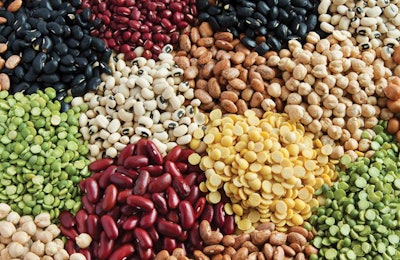
On July 12, the United States Food and Drug Administration Center for Veterinary Medicine notified the public that some canine dilated cardiomyopathy (DCM) cases were correlated to dogs eating particular diets. These diets contained large amounts of potatoes or legume seeds, also known as pulses, such as peas and lentils. However, FDA’s investigation is just beginning and not all legume seeds, a group including beans, are implicated, especially since many aren’t used in high quantities, said an agency representative.
Which legumes are involved in FDA investigation?
FDA’s warning stated: Diets in cases reported to the FDA frequently list potatoes or multiple legumes such as peas, lentils, other “pulses” (seeds of legumes), and their protein, starch and fiber derivatives early in the ingredient list, indicating that they are main ingredients.
Legumes, classed in the family Fabaceae, and their seeds include various products used in pet and human food. For example, kidney, navy, pinto and green beans are all varieties of the legume Phaseolus vulgaris. Soy beans (Glycine max) too are legumes. Beyond whole beans, other products used in pet food are made from beans, such as guar gum, a thickening agent used mostly in wet pet foods, which is made from the legume Cyamopsis tetragonoloba.
The FDA is still investigating individual ingredients under the legume, pulse or potato “umbrella,” said Anne Norris, FDA Center for Veterinary Medicine health communications specialist.
“So, I would suggest not taking intuitive leaps beyond what is explicitly stated in our public notice right now,” she said.
For example, guar gum is generally recognized as safe (GRAS) for use as a stabilizer (21 CFR 582.7339), she said. Stabilizers like guar gum are not ordinarily included in pet food in such a large concentration that they would be listed toward the top of the ingredient list (as a main ingredient). Likewise, many othey legumes aren’t implicated in FDA’s investigation, since they appear in small amounts or are uncommon in dog food.
FDA study of potatoes and pulses link to dog heart disease still early
The FDA investigation remains in its initial stages, as the agency examines the possible connection between canine dilated cardiomyopathy (DCM) and high levels of certain dog food ingredients.
“It is still early in the investigation and right now we’re simply notifying the public, practitioners, and manufacturers that we are observing a signal that warrants further study,” said Norris. “The common thread seems to be legumes and/or potatoes as main ingredients in the food. Currently, it’s a correlative link, not a causative one. We’re hoping that after receiving data from pet owners and veterinarians, we will have more data to further inform our investigation.”
As the investigation continues, FDA hopes that the public and veterinarians will collaborate with the agency to bring more cases to their attention.
“We recommend that concerned pet owners check the ingredients of the formula that they are currently feeding their dog and then consult their veterinarian about any potential diet changes,” she said. “If a dog is displaying symptoms of DCM, we would be most appreciative to learn more and to consult with veterinarians about the clinical details, so that we can hopefully learn more about any potential connection between DCM and diet.”
















